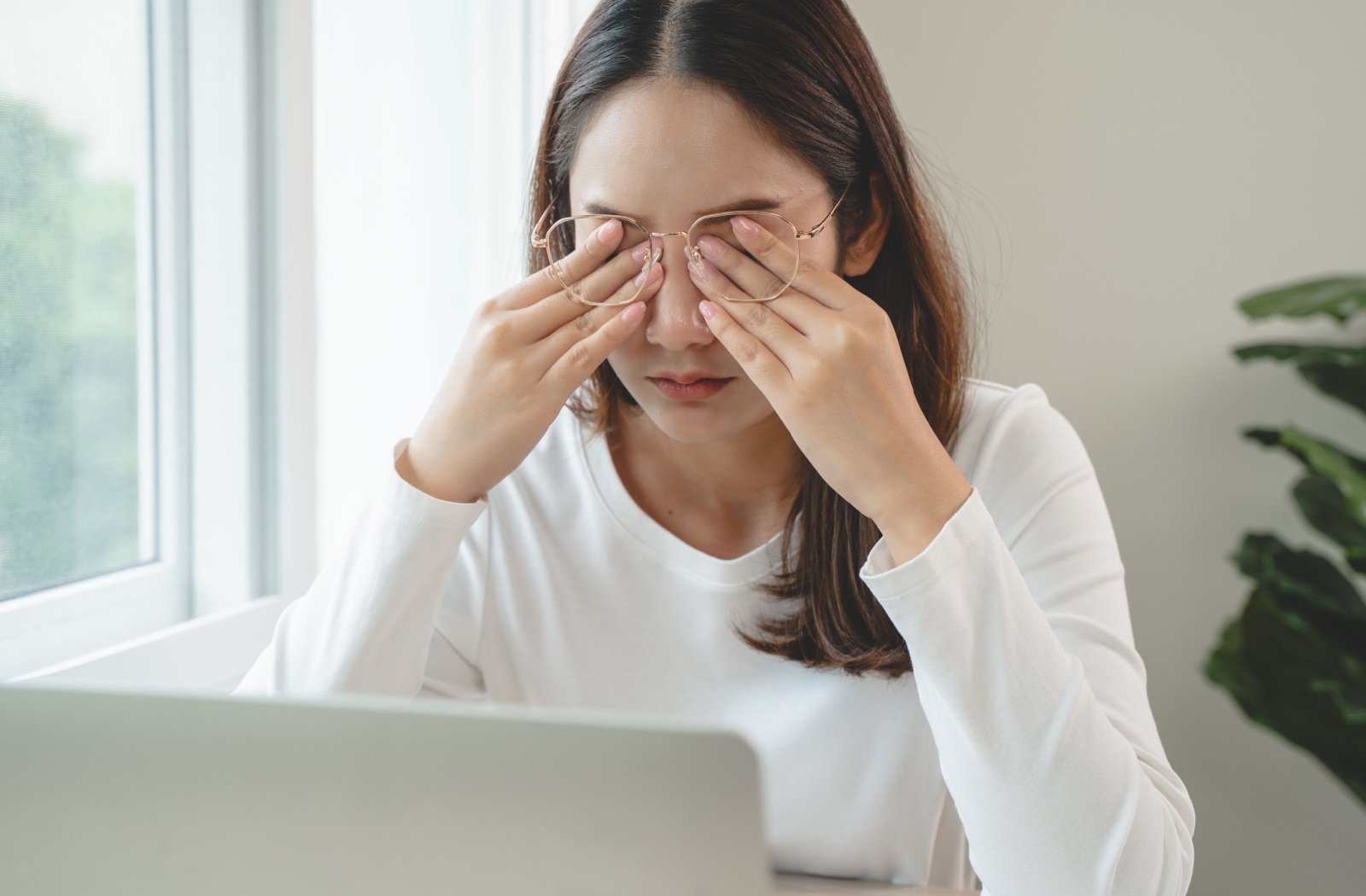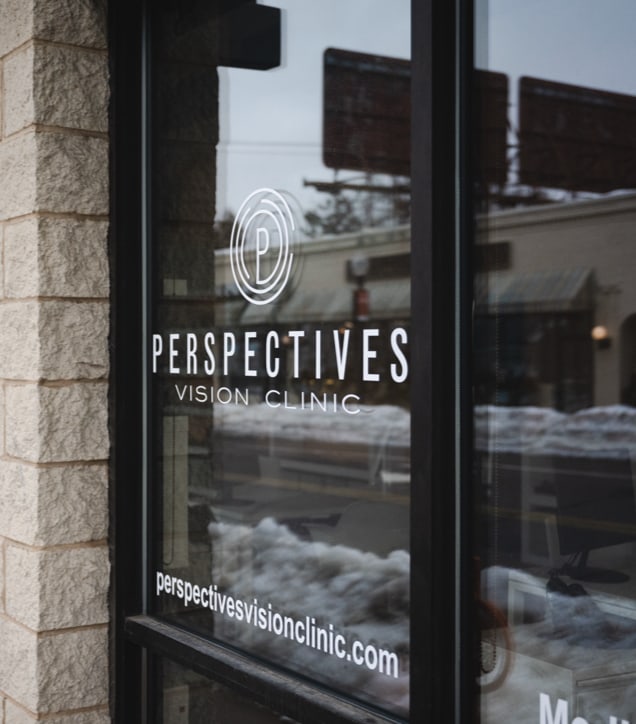Dry eyes and floaters are both common eye issues, but they affect your vision in different ways. While both can occur simultaneously, dry eyes do not directly cause floaters. However, experiencing these conditions together may exacerbate the resulting discomfort or make floaters more noticeable.
At Perspectives Vision Clinic, we offer comprehensive eye care services to manage both dry eyes and floaters and help your eyes stay healthy.
What Are Dry Eyes?
Dry eyes occur when your tear ducts don’t produce enough tears or when the quality of these tears is poor. This condition can lead to a range of uncomfortable symptoms, including:
- Stinging or burning sensation
- Grittiness or the feeling that something is in your eye
- Blurry vision
- Sensitivity to light
- Redness in the eyes
Dry eyes can be caused by various factors, such as aging, prolonged screen use, certain medications, or environmental conditions like wind or dry air. Treating dry eyes typically involves artificial tears, prescription eye drops, lifestyle changes, and sometimes more advanced treatments such as IPL therapy, depending on the severity of the condition.

What Are Floaters?
Floaters appear as tiny spots, threads, or cobweb-like shapes that drift across your field of vision. They are actually small pieces of debris in the eye’s vitreous, a gel-like substance that fills the eye.
Floaters become more common as you age, and they occur when the vitreous shrinks and becomes more liquefied, causing bits of collagen to clump together and cast shadows on the retina. These shadows are what you perceive as floaters.
Floaters tend to move as you move your eyes and are most noticeable when looking at bright, plain backgrounds, such as a clear sky or a white wall. While they’re usually harmless, a sudden increase in floaters, especially when accompanied by flashes of light, may indicate a retinal tear or detachment, which requires immediate medical attention. If you experience a sudden increase in floaters, flashes, or peripheral vision blur, it is critical that you visit your optometrist as soon as possible (within 24 to 48 hours).
The Relationship Between Dry Eyes and Floaters
As mentioned earlier, dry eyes don’t cause floaters, but the presence of both conditions can lead to greater discomfort. Dry eyes may make you more aware of floaters due to the discomfort and blurry vision caused by dry eye making floaters seem more pronounced. If your eyes are strained due to dryness, you may become more sensitive to visual disturbances like floaters.
Although the conditions aren’t linked, managing dry eyes may help make floaters seem less noticeable, especially if dryness is causing you to rub your eyes or squint more often. Squinting or rubbing your eyes may worsen both conditions by adding to the irritation and making floaters more prominent.
Why Do Floaters Appear?
Floaters are generally a natural part of the aging process. As the vitreous inside the eye shrinks and liquefies, small clumps form and cast shadows on the retina. The retina, located at the back of the eye, processes light and sends visual signals to the brain.
When floaters cast shadows on the retina, your brain interprets these shadows as objects drifting in your line of sight.
In addition to aging, floaters can be associated with:
- Eye injuries: Trauma to the eye can lead to vitreous detachment, which causes floaters.
- Eye surgeries: Certain surgeries, like cataract removal, can increase the risk of floaters.
- Inflammation: Inflammatory conditions affecting the eye, such as uveitis, can lead to floaters.
- Nearsightedness: People with myopia (nearsightedness) are more prone to floaters.
If you notice a sudden increase in floaters, experience flashes of light, or blurred peripheral vision, you should seek medical attention immediately, as these can be warning signs of a retinal tear or detachment, which may result in vision loss if not treated promptly. Be sure to visit your optometrist within 24 to 48 hours if you experience these symptoms.
Managing Dry Eyes and Floaters
While dry eyes and floaters may not be directly related, managing both conditions can improve your overall eye comfort and health. Here are some strategies to help manage each condition:
Strategies for Managing Dry Eyes:
- Artificial tears: Over-the-counter artificial tears can help lubricate your eyes and alleviate dryness.
- Prescribed eye drops: Your eye doctor may recommend medicated drops for more severe cases of dry eyes.
- Reduce screen time: Take breaks from digital screens to prevent eye strain and dryness.
- Improve your environment: Use a humidifier to add moisture to the air, especially during winter months when indoor heating can dry out your eyes.
- Warm compresses: Applying a warm compress to your eyes can help unclog oil glands and improve tear quality.
Strategies for Managing Floaters:
- Observation: In most cases, floaters will diminish in prominence over time and are harmless. If you notice a sudden increase in floaters, visit your optometrist as soon as possible.
- Vitrectomy: In rare, severe cases, a vitrectomy can be performed to remove the vitreous and reduce floaters.
- Regular eye exams: Routine eye exams are important to monitor any changes in floaters and to confirm your retina remains healthy.
When to See a Doctor
Both dry eyes and floaters can be managed, but certain symptoms should not be ignored. You should see an eye doctor if:
- Your dry eye symptoms worsen or persist despite treatment.
- You notice a sudden increase in floaters, especially when accompanied by flashes of light.
- You experience a loss of peripheral vision, which could indicate a retinal detachment.
At Perspectives Vision Clinic, our team is dedicated to helping you manage both dry eyes and floaters, making sure your vision stays clear and comfortable. Through comprehensive exams and personalized treatment plans, we can address these conditions and help you enjoy better eye health.
Managing Two Common Eye Conditions
Dry eyes and floaters are separate conditions, but they can both affect your comfort and quality of vision. While dry eyes don’t cause floaters, addressing both issues can improve your overall eye health.
If you’re experiencing dry eyes, floaters, or any other vision concerns, don’t hesitate to book an appointment with Perspectives Vision Clinic for a thorough eye exam and tailored care.










